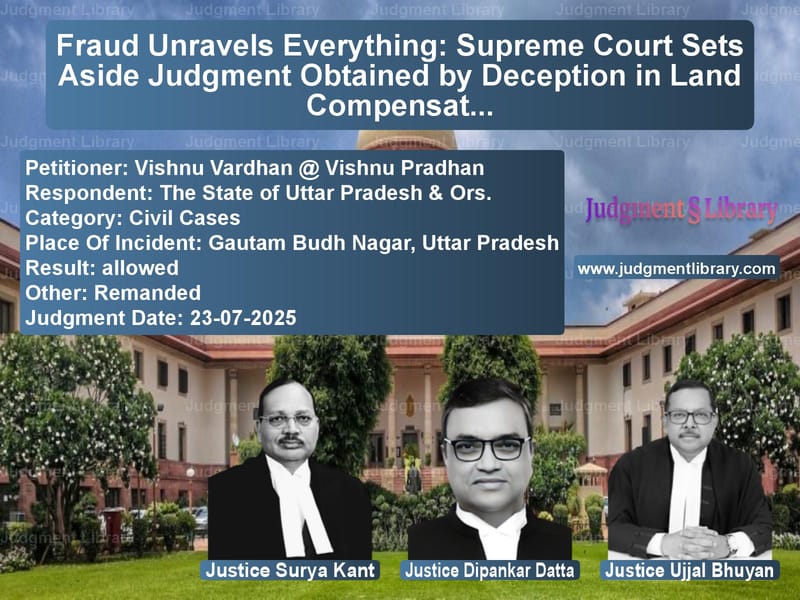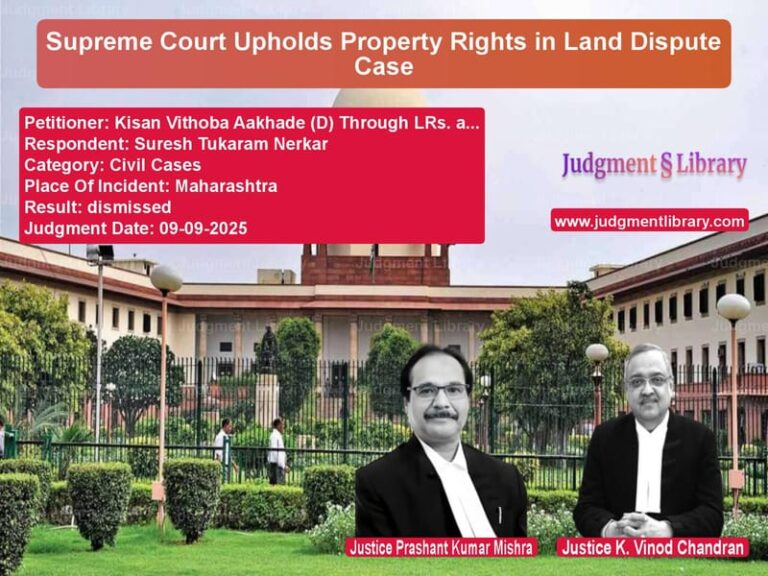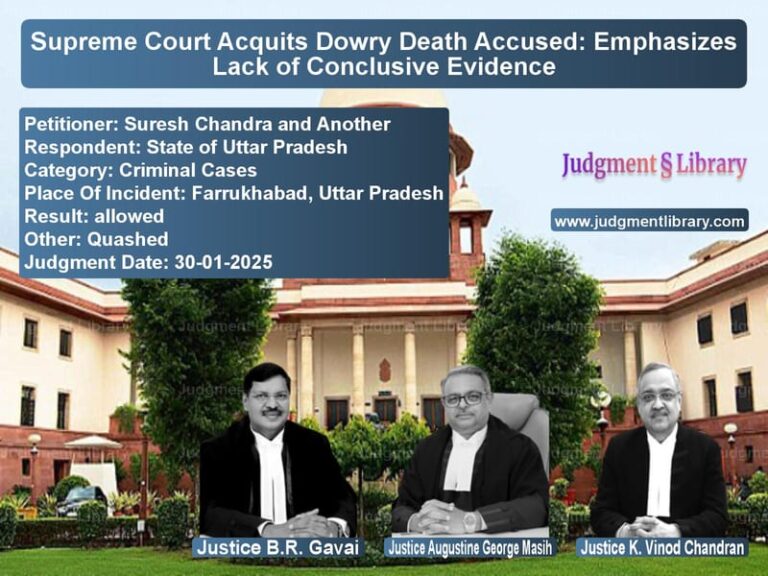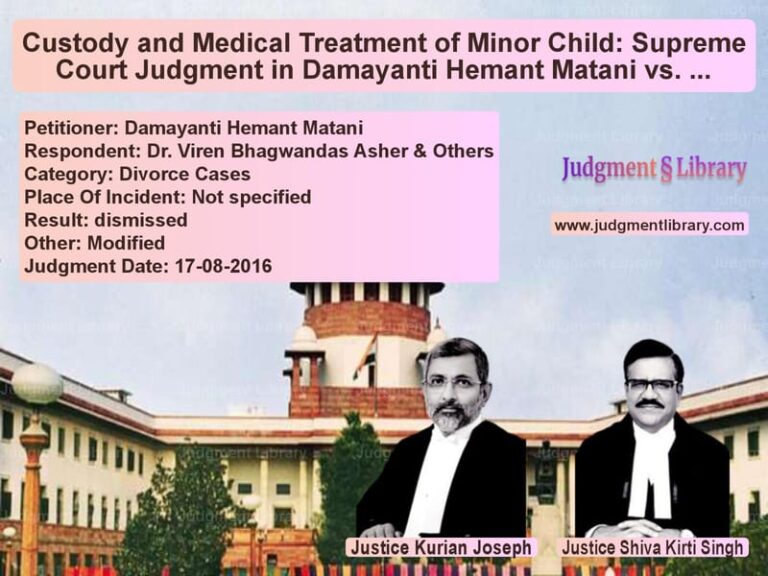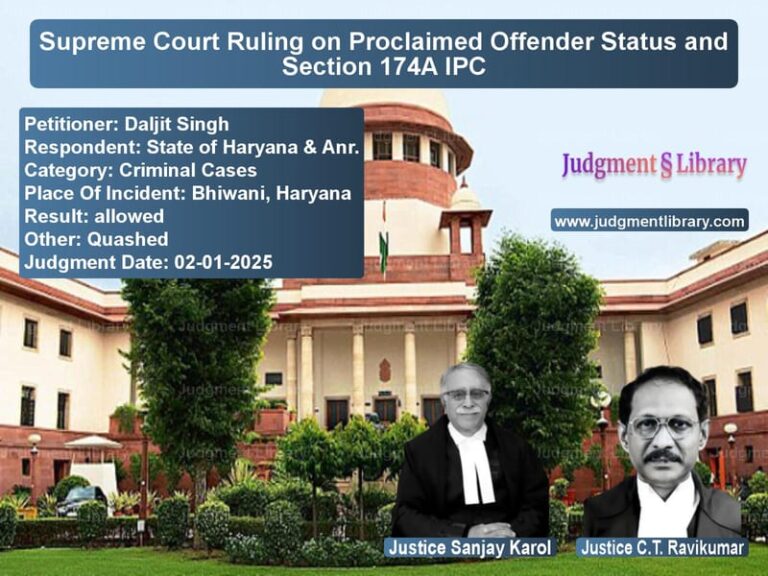Fraud Unravels Everything: Supreme Court Sets Aside Judgment Obtained by Deception in Land Compensation Case
In a landmark judgment that reinforces the fundamental legal principle that fraud vitiates all judicial acts, the Supreme Court of India has set aside a compensation award obtained through deception and suppression of material facts. The case involving Vishnu Vardhan and Reddy Veeranna centered around a disputed land acquisition compensation worth hundreds of crores, where one co-owner allegedly manipulated court proceedings to claim exclusive rights to the compensation amount.
The Supreme Court emphatically declared that “fraud unravels everything,” echoing the centuries-old legal maxim that has guided judicial systems worldwide. The three-judge bench comprising Justices Surya Kant, Dipankar Datta, and Ujjal Bhuyan delivered a comprehensive 85-page judgment that not only exposed the fraudulent practices but also established important precedents regarding the maintainability of appeals in cases involving fraud.
The Core Legal Principle
The judgment begins with a powerful reaffirmation of the legal principle against fraud. The Court quoted from its earlier decision in Nidhi Kaim v. State of Madhya Pradesh, where it had emphatically asserted: “stated simply, nothing … nothing … and nothing, obtained by fraud, can be sustained, as fraud unravels everything.”
The Court further referenced S.P. Chengalvaraya Naidu v. Jagannath, noting the growing trend of abuse of the process of law by dishonest litigants playing fraud on courts. The opening paragraph of this decision was particularly significant: “Fraud avoids all judicial acts, ecclesiastical or temporal observed Chief Justice Edward Coke of England about three centuries ago. It is the settled proposition of law that a judgment or decree obtained by playing fraud on the court is a nullity and non est in the eyes of law. Such a judgment/decree — by the first court or by the highest court — has to be treated as a nullity by every court, whether superior or inferior. It can be challenged in any court even in collateral proceedings.”
The Court warned that: “The principle of finality of litigation cannot be pressed to the extent of such an absurdity that it becomes an engine of fraud in the hands of dishonest litigants. The courts of law are meant for imparting justice between the parties. One who comes to the court, must come with clean hands.”
The Factual Background
The dispute originated from a land purchase in 1997 when Vishnu Vardhan, Reddy Veeranna, and T. Sudhakar jointly purchased land measuring 5-13-10 Bighas at Khasra No. 422 and 427M of Village Challera Banger, Gautam Budh Nagar, for Rs. 1 crore. Only 2-18-10 Bighas of land which was unacquired by NOIDA became the subject of the present proceeding.
The trio consistently projected themselves as co-owners in multiple judicial proceedings from 1998 until 2019. They jointly instituted suits, filed execution applications, and pursued writ petitions challenging various actions by NOIDA. However, Reddy began asserting exclusive ownership through various means, including obtaining a compromise decree in 2006 that Vishnu claimed was fraudulent.
The critical turning point came when Reddy filed a writ petition before the Allahabad High Court in 2019, claiming sole ownership of the property and seeking enhanced compensation. The High Court, in its order dated October 28, 2021, accepted Reddy’s claim and enhanced the compensation from Rs. 181.87 per sq. yard to Rs. 1,10,000 per sq. metre. This order was subsequently challenged before the Supreme Court by NOIDA, and in Reddy Veerana v. State of U.P. (2022), the Supreme Court partly allowed Reddy’s appeal while dismissing NOIDA’s appeal.
The Allegations of Fraud
Vishnu Vardhan approached the Supreme Court alleging that Reddy had played fraud on the courts by suppressing material facts and making inconsistent claims. The core of Vishnu’s argument was that while Reddy had consistently asserted joint ownership with Vishnu and Sudhakar in multiple proceedings from 2001 till 2019, he asserted sole ownership in other proceedings, particularly in the writ petition that led to the enhanced compensation.
The Supreme Court noted several instances of Reddy’s contradictory conduct: “In a judicial landscape that values consistency and candour, this case strikes a discordant note. This trajectory of the contradictory claims made by Reddy can hardly be ignored by this Court.”
One particularly troubling instance was the suit filed by Reddy against Vishnu in 2006, where one Venkataramana, claiming to be Vishnu’s attorney, filed a written statement admitting Reddy’s claims. However, records revealed that the Power of Attorney had been cancelled six months prior to the suit being instituted. The Court discovered that Venkataramana was also a partner of Reddy in the firm Manyata-Pristine, which raised serious questions about the bona fides of the proceedings.
The Court observed: “Considering Reddy’s consistent stance in earlier proceedings that the property was jointly owned with Vishnu and Sudhakar, his failure to implead them in the writ petition is appalling, if not more. This, in our view, was a calculated attempt by Reddy to wrongfully appropriate the entire property keeping the other two – Vishnu and Sudhakar – in the dark.”
The Court’s Analysis on Fraud
The Supreme Court conducted a thorough examination of the factual matrix and concluded that Reddy had indeed played fraud on the courts. The Court held: “Obtaining of the impugned order by Reddy in his favour by playing fraud on the High Court is conspicuous by its presence. Thus, we find Vishnu’s core argument to be creditworthy and compelling for us to hold that judicial orders procured by Reddy by subverting the judicial process through fraud and concealment of material facts cannot be permitted to stand.”
The Court referenced multiple decisions establishing that fraud vitiates even the most solemn proceedings. In United India Insurance Co. Ltd. v. Rajendra Singh, the Court had reiterated that “fraud and justice never dwell together” and that “no judgment of a court, no order of a Minister can be allowed to stand if it has been obtained by fraud, for, fraud unravels everything.”
In Shrisht Dhawan v. Shaw Bros., it was held: “Fraud and collusion vitiate even the most solemn proceedings in any civilised system of jurisprudence.” The Court also referenced A.V. Papayya Sastry v. Govt. of A.P., where it was held: “It is thus settled proposition of law that a judgment, decree or order obtained by playing fraud on the court, tribunal or authority is a nullity and non est in the eye of the law. Such a judgment, decree or order—by the first court or by the final court—has to be treated as nullity by every court, superior or inferior. It can be challenged in any court, at any time, in appeal, revision, writ or even in collateral proceedings.”
Arguments on Maintainability
Reddy raised multiple objections regarding the maintainability of Vishnu’s appeal and writ petition. He argued that the impugned order had merged with the Supreme Court’s order in Reddy Veerana (supra), and therefore, the present appeal was not maintainable. He also contended that the writ petition under Article 32 was not maintainable as it did not disclose violation of any fundamental rights.
The Supreme Court, however, rejected these arguments, holding that fraud constitutes an exception to the doctrine of merger. The Court stated: “Acceptance of the contention of Reddy would lead to a situation akin to a juridical cul-de-sac, where no option is available to Vishnu to assert his legal rights. Adopting a hands-off approach weighed down by the fact of existence of a judicial order of this Court of competent jurisdiction and thereby keeping it untouched (despite proof of such judicial order having been procured by fraud), would be a travesty of justice.”
On the issue of merger, the Court held: “Having noted that fraud is an exception to the doctrine of merger and considering that the impugned order of the High Court and the decision of this Court in Reddy Veerana (supra) have been found by us to be vitiated by fraud, the argument by learned senior counsel for Reddy as regards the non-maintainability of the present proceedings based on the merger doctrine is of no significance.”
The Final Ruling
In its conclusive findings, the Supreme Court set aside the impugned order of the High Court dated October 28, 2021, and recalled its own judgment in Reddy Veerana (supra), declaring both to be nullities due to being obtained by fraud. The Court remanded the matter to the High Court for fresh consideration with directions to implead Vishnu Vardhan and T. Sudhakar as additional respondents.
The Court directed: “WP (Civil) 2272/2019 will be decided afresh by the High Court in accordance with law, upon hearing all interested parties.” The Court also requested the Chief Justice of the High Court to preside over the Division Bench for final disposal of the writ petition, preferably by the year end.
The Supreme Court’s judgment serves as a powerful reminder that the judicial process cannot be manipulated for personal gain. By unequivocally stating that “fraud unravels everything,” the Court has reinforced the fundamental principle that honesty and transparency are non-negotiable in legal proceedings. The judgment not only provides relief to the aggrieved party but also strengthens the integrity of the judicial system by ensuring that fraudulent practices do not go unchecked, regardless of how high they reach in the judicial hierarchy.
Petitioner Name: Vishnu Vardhan @ Vishnu Pradhan.Respondent Name: The State of Uttar Pradesh & Ors..Judgment By: Justice Surya Kant, Justice Dipankar Datta, Justice Ujjal Bhuyan.Place Of Incident: Gautam Budh Nagar, Uttar Pradesh.Judgment Date: 23-07-2025.Result: allowed.
Don’t miss out on the full details! Download the complete judgment in PDF format below and gain valuable insights instantly!
Download Judgment: vishnu-vardhan-@-vis-vs-the-state-of-uttar-p-supreme-court-of-india-judgment-dated-23-07-2025.pdf
Directly Download Judgment: Directly download this Judgment
See all petitions in Property Disputes
See all petitions in Damages and Compensation
See all petitions in Fraud and Forgery
See all petitions in Legal Malpractice
See all petitions in Contempt Of Court cases
See all petitions in Judgment by Surya Kant
See all petitions in Judgment by Dipankar Datta
See all petitions in Judgment by Ujjal Bhuyan
See all petitions in allowed
See all petitions in Remanded
See all petitions in supreme court of India judgments July 2025
See all petitions in 2025 judgments
See all posts in Civil Cases Category
See all allowed petitions in Civil Cases Category
See all Dismissed petitions in Civil Cases Category
See all partially allowed petitions in Civil Cases Category

